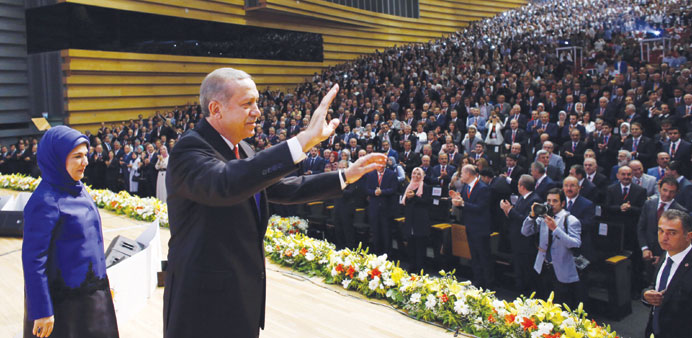AFP
Turkish Prime Minister Recep Tayyip Erdogan has declared his candidacy for the August presidential election which is expected to make him Turkey’s longest-serving and most dominant leader since Ataturk.
Erdogan – tipped to win the poll despite a turbulent year that saw unprecedented protests against his rule – vowed the election would mark a turning point for a “new Turkey”.
The election will be the first time Turks will directly choose a president, and Erdogan indicated he intended to be much more than a ceremonial head of state.
But the secular opposition – which strongly opposes his Justice and Development Party (AKP)’s Islamic-tinted rule – denounced Erdogan as a violator of the rule of law who had no right to be president.
But launching his campaign in Ankara in a speech to 4,000 cheering party members laced with Islamic references, Erdogan said: “The owner of this victory is only Allah. We are bracing for a blessed journey to serve the people.”
Erdogan’s wife Emine could be seen wiping tears from her eyes while his boisterous supporters chanted “Turkey is proud of you!”
If he wins, Erdogan, 60, would serve as president until 2019, with the possibility of a second mandate, making him Turkey’s longest-serving leader since the founder of the modern Turkish republic, Mustafa Kemal Ataturk.
However, his move to switch from the premier’s office to the Cankaya presidential palace in Ankara comes at the most turbulent moment in his decade-long domination of Turkey.
The government was shaken by mass protests in 2013, a torrent of corruption allegations, a damaging feud with former allies, and most recently its clumsy response to the Soma mine disaster that killed 301 people.
Still hailed by supporters for presiding over an economic transformation of the majority Muslim country, Erdogan is now accused by critics of running the country like an Ottoman sultan, and has become an increasingly polarising figure.
His candidacy means Erdogan’s one-time close ally and co-founder of the Islamic-rooted AKP, incumbent President Abdullah Gul will be stepping aside, with his political future uncertain.
Gul, who has repeatedly squabbled with Erdogan in recent months, appeared to be absent from the Ankara rally, which was attended by the entire AKP elite.
If elected president, Erdogan is expected to wield far greater power than previous incumbents, and he has indicated the direct election would give the head of state a greater mandate despite no constitutional backing.
The president was previously chosen by parliament.
“The fact that the president will be elected by the people is a turning point for democracy,” declared Erdogan. “The presidency will not be a place of rest.”
In an apparent reference to the AKP’s drive to lessen the historic influence of the powerful Turkish military, he added that a democratically-elected president “will put an end to a dark period of tutelages”.
Despite his recent troubles, Erdogan still commands fervent support across the country, especially from rural populations and religiously conservative small business owners who prospered under his rule.
Erdogan is widely expected to win the election, possibly with an outright majority in the first round of voting on August 10.
Kemal Kilicdaroglu, head of the opposition Republican People’s Party (CHP) that accuses the premier of wide scale corruption, said Erdogan had no right to stand in the election.
“Someone who tells lies, who does not have high standards of morality ... and has a shadowy past cannot be a presidential candidate,” he said.
To the surprise of many, the CHP and nationalist MHP have jointly fielded a devout intellectual – the former head of the Organisation of Islamic Co-operation, Ekmeleddin Ihsanoglu – as to challenge the pious Erdogan.
But while Ihsanoglu, 70, may play well with religious voters, the bespectacled and softly spoken academic has none of the charisma of the combative Erdogan.
“I didn’t start this struggle after I turned 60. I’ve been in it since I was 18,” sniped Erdogan in apparent reference to his rival’s age and lack of experience.
Meanwhile, the main pro-Kurdish party on Monday announced its candidate would be Selahattin Demirtas, an energetic figure who nonetheless is expected to struggle to break into double figures.
Erdogan said the stalled peace process with Kurdish rebels would continue.
“Turkey has no other option than a solution, brotherhood and peace,” he said.
He also reaffirmed he would work for Nato member Turkey’s full accession to the European Union.

